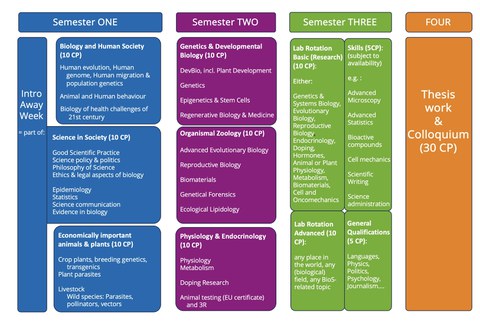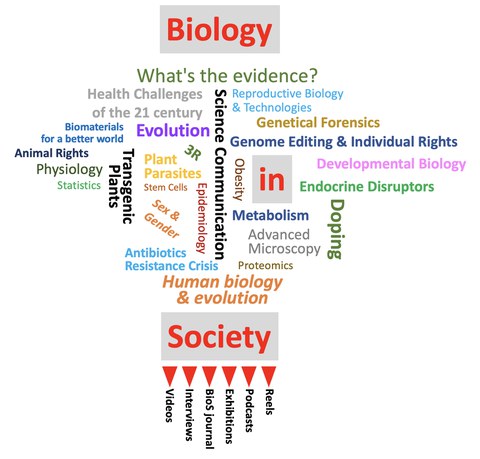Master Biology in Society (BioS)
Table of contents
Biological processes deeply affect humankind in the 21st century, and biological methods have the potential to interfere with norms established over centuries, incl. human rights. Every individual is different genetically and by upbringing; societal measures to tackle biological issues can be inherently unjust to some but not to others. Biological processes, methods, and any potential injustices are to be communicated clearly and simply, but not over-simplified. Our degree course emphasizes cooperation among, not competition between, students. This is our mission for Biology in Society. We aim to equip students with a profound theoretical and practical knowledge of genetics and developmental biology, evolution, reproduction and physiology, of animals and plants and their societal significance. We address issues of research ethics, animal testing & animal welfare, science communication and societal aspects of science. One entire semester is dedicated to students doing cutting-edge practical research projects in laboratories and places of their choice.
Overview and course contents:

Overview of the structure of Biology in Society, starting with the first semester (blue)
Official course documents are here. Information and application website for non-EU applicants. Deadline 31 May 2026 More explanation: here. And again in the official course documents here. E-mail requests with questions that are explained in these documents will not be answered. Also see "In a nutshell: Requirements to apply for 'Biology in Society' " just below.
Information and application website for EU applicants. Deadline 5 June 2026 More explanation: here. Applicants with a B.Sc. from a German university: please apply via the selma system. Please send your application to: TUD Dresden University of Technology, Faculty of Biology, Admission/ Access Committee Biology in Society, 01062 Dresden. You will hear from us shortly after whether you are invited for interview. Online interviews will be held on June 2026. Please keep this time free if you appy to BioS. You will receive a letter from us, confirming your suitability for Biology in Society. Shortly after, you will receive the official enrolment letter. NON-EU applicants: Immediately apply with this letter for a visa at the German embassy. If your visa is issued too late, you will miss the mandatory introductory week of BioS and will be referred to next year's starting cohort.
Do you want to know what is actually going on in our course? See here a brief introductory video. AND: Students in our course run their own journal BioS Reports. Please see the issues here individually or download any issue.
In a nutshell: Requirements to apply for 'Biology in Society'
- A B.Sc. in Biology or related topic (or a documented completion of 80% of the degree). BSc-level knowledge in zoology, botany, including physiology, molecular biology, genetics, evolution, and statistics. One of these may be missing - you would have to catch up with it yourself, though.
- A meaningful letter of motivation: Please tell us in simple words why do you want to study "Biology in Society". ChatGPT will not be able to do that for you. We are not impressed either by other online templates, such as "I am highly motivated to pursue this programme, as it aligns perfectly with my academic background and long-term career aspirations". In the past, most people were not suitable for the course because their motivation letter was insufficient.
- English as a mother tongue, certificate of the advanced level B2, or evidence that previous courses and exams were taken in English, as detailed in the official documents here. Please consult them before contacting us with any requests about your English certificate. A certificate for German is not required.
Contact details. Something you didn't find on the above websites? E-mail us .
You can also find more information about the course at the central study information system.
Important Upcoming Dates
- 31 May/ 5 June deadline for 2026/27 international/ German-degree holding students
- June 2026 Interviews (aptitude assessment) for prospective 2026/27 students. You will get to know the outcome within one week and should receive the formal erolment letter within another two weeks.
- Oct 2026 Welcome event for the new BioS students. All new BioS students are encouraged to participate. Visitors and guests are welcome!
- 12 - 16 Oct 2026 Introductory away-week (mandatory). All first-year students of Biology in Society will go to a youth hostel in Kollm near Quitzdorf in the Lausitz. We will take courses in: Good scientific practice // Ethical and legal aspects of research and biology// Policy, politics and philosophy of science. We will have scientific talks, and will get to know each other. The intro week is an all-time favorite of all students (see issues 6,17,30 of BioSReports) and is designed to foster the collaborative, not competitive nature of Biology in Society.

